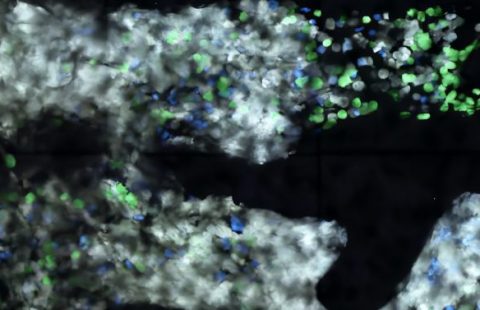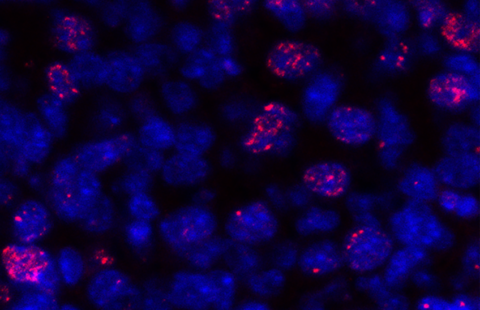Some individuals are better able to fight cancer for many years compared with others. This ability to fight tumours depends on the immune response, as observed for colorectal cancers by Jérôme Galon, Research Director at Inserm, and his team, the Laboratory of Integrative Cancer Immunology, at the Cordelier Research Centre (Inserm/UPMC/Paris Descartes University). The investigators show that the proportions of immune system cells in and around the tumour change with the stage of progression of the cancer, and demonstrate the importance of an increased concentration of some cell types to the survival of patients, namely, follicular T-helper cells (Tfh) and B lymphocytes. A better understanding of the dynamics of these cells will help to identify new strategies for developing targeted immunotherapies.
The results of this study are published in the 17 October issue of the journal Immunity.
The immune system is able to fight some tumours before they can affect health. Once the tumour has been identified, immune system cells are mobilised to kill and eliminate the tumour cells. However, tumour cells can sometimes manage to survive the response of the immune cells, and become established. The tumour becomes malignant when it develops in an uncontrolled manner. The investigators at the Cordelier Research Centre (Inserm/UPMC/Paris Descartes University) study the manner in which the immune system fights tumours, in an effort to effectively unleash the body’s intrinsic potential for fighting cancer.
Two factors indicate the body’s potential for “fighting or defeating” a tumour: the intensity of the immune response, and the mechanisms adopted by tumours to escape recognition by the immune system. The complex interactions between tumours and their microenvironment were poorly known until now. In the present study, the investigators examined the spatiotemporal dynamics of 28 different types of immune system cells that infiltrate colorectal tumours. By combining the study of cellular interactions with bioinformatics, they observed that the proportions of immune system cells infiltrating tumours change with the stage of progression of the tumour.
The research team has demonstrated the importance of an increased concentration of some types of immune system cells to patient survival, i.e. the T follicular-helper (Tfh) cells and B lymphocytes. These results obtained for human tumours were also demonstrated in three mouse models of colon cancer.
The investigators also studied more specifically in patients the instability of the gene for the chemokine CXCL13, which modulates the infiltration of Tfh and B lymphocytes. CXCL13 and IL-21 have proven to be additional factors that promote the death of tumour cells: high levels of these molecules are correlated with patient survival.
These observations indicate that T, Tfh and B lymphocytes form a network of cells that communicate inside tumours. High levels of Tfh and B lymphocytes prevent tumour progression and recurrence in colorectal cancer. As in patients, T, Tfh and B lymphocytes control tumour development in murine models of colon cancer.

